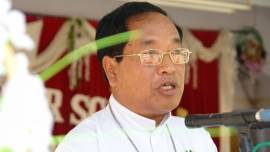By Matters India Reporter
Imphal, May 16, 2023: The head of the Catholic Church in Manipur has appealed for aid for the violence-hit people of the northeastern Indian state of Manipur.
The Catholic Church in the Archdiocese of Imphal is pained, saddened and concerned at the situation after unprecedented violence and unrest on May 3 took Manipur like a storm, says a “relief appeal” from Archbishop Dominic Lumen of Imphal.
The archdiocese covers the entire state of Manipur where Christians form more than 41.29 percent of 3.43 million people. Hindus account for 41.30 percent, Muslims 8.4 percent and other religions account for the rest.
As soon as the violence broke out, the administration snapped internet services in Manipur for five days, keeping the rest of the world in the dark about the happenings in the state.
The May 14 message from Archbishop Lumon bemoans that the violence scores of live, burned or destroyed houses, belonging of people looted and places of worship desecrated or torched. According to him, as many as 121 churches belonging to various Christian denominations were destroyed during the violence
The prelate says thousands of people are rendered homeless and languish in various shelters in military barracks and relief camps.
“Many have left the capital Imphal and the state to safer places. Those who were in hills belonging to the valley communities in panic have to rush back to the valley. Summarily, there is fear, uncertainty and a general sense of hopelessness and desperation,” the archbishop explains.
According to Archbishop Lumon, about 45,000 people live in relief camps in the valley and the hills. Around 13,800 in Imphal west, around 11,800 in Imphal East, around 4,500 in Bishnupur, 5,500 in Churachandpur, around 7,000 people in Kangpokpi district.
“The government has evacuated quite many to the safe destination as of now. This information’s are based on the daily newspapers and our own information. The actual number could be more. Spot verification is not possible as the situation is tense. Also there is a planned economic blockade looming in the sky,” the appeal says.
The prelate says the archdiocese has initiated some relief services with its limited resources. “We are reaching out to the people in all possible ways,” he says and pleads for “resources in kind and cash” to help the people.
“Please contribute generously so that we may be empowered to give better life to our displaced brothers and sisters,” the appeal adds and provides an account number to send contributions.
Archbishop Lumon analyzes the reasons and circumstances that led to the flare up.
He said several issues had remained unresolved for a long time, gradually building up emotions and general angst.
The immediate spark for the violence was the demand of the Meitei community to be listed as a Schedule Tribe and “vehement opposition of the Tribal to this demand.
The Meitei people, who live most in the Imphal Valley, represent around 53 percent of the population, followed by various Naga ethnic groups at 24 percent and various Kuki/Zomi tribes (also known as Chin-Kuki-Mizo people) at 16 percent.
The opposition to Meitei demand was spearheaded by the tribal student organizations and civil voluntary organizations.
Added to this was the Manipur High Court’s recommendation to the state government to forward the Meitei demand to the federal government .
At the same time, the government started a survey of the forests in the state – reserved, protected and conserved – and the tribal groups that live near them objected to the move.
The tribal groups pointed out the survey had not received the consent for the Hill Area Committee that controls the forest areas.
The survey was followed by eviction and displacement of villages in the forest lands and most affected were those inhabited by Kukis.
“Two communities are warring but it has affected all the people of Manipur irrespective of which community one belongs. With the complexity of issues that has given rise to this situation, there seems to be no clear-cut reason for the present crisis,” Archbishop Lumon says.

